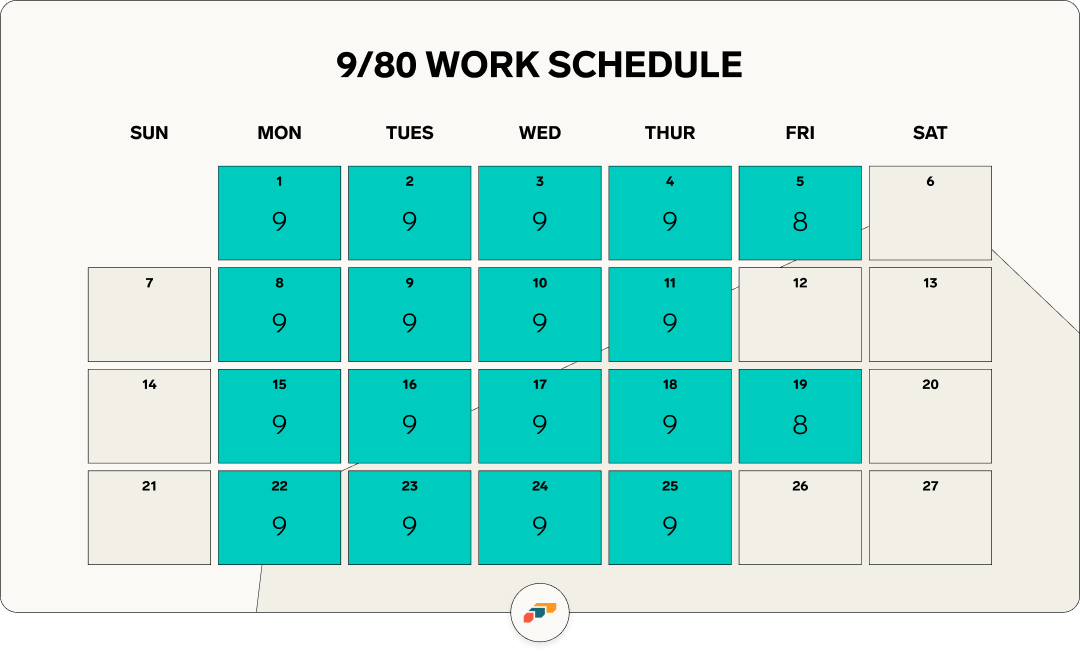Origins to Innovation: Cloud Computing's Impact on HR
Do you know why it's called cloud computing and are you aware of the benefits to HR?
- 06 Jun 2024
- Max 11 min read
The Number One HR Solution on Salesforce
If you're curious about alternative work schedules, you're in the right place. In this article, we'll dive into the concept of a 9/80 work schedule — a flexible arrangement that offers extended weekends without compromising productivity.
Many organizations still operate on a standard 9-to-5 schedule. This means that employees work set days (usually Monday through Friday) and set hours (usually 9 a.m. to 5 p.m.).
However, have you, your HR department or your hire-level managers ever thought about trialing any alternative work schedules? If so, we’re going to give you even more food for thought.
This blog post explains the intricacies, pros, and cons of one of the fastest-growing work plans, the 9/80 schedule. We’ll outline why many companies are changing their traditional models and hours of work for this new format.
Additionally, we’ll also explore how you can integrate and trial this new type of structure into your own company. After all, this schedule could prove productive, engaging, and beneficial to your own workforce. It might even result in a better work-life balance for you and your employees. Sound intriguing? Great, let’s get started.
The 9/80 schedule is designed around a simple concept: employees work eight nine-hour days and one eight-hour day over a two-week period. The schedule is split into two segments, with specific hours allocated to each day.
During the first week, employees work four nine-hour days, from Monday to Thursday. On Friday, they complete an eight-hour workday. By working four nine-hour days, employees accumulate a total of 36 hours. The remaining four hours on Friday complete the 40-hour workweek. These final four hours also serve as the starting point for the subsequent payroll week.
In the second week, employees continue with four more nine-hour workdays, completing another 40-hour workweek. As a result, they have the option to take the second Friday off, providing them with a three-day weekend. Following this extended break, the cycle repeats itself on the following Monday, initiating another round of the 9/80 schedule.
Some organizations have decided to jump aboard this new model of working in the hope that it will boost employee productivity and engagement. The standard scheduled workweek might no longer work for all employees and companies, particularly in this day and age when many people work from home or at least in a hybrid remote model.
In a recent survey by EY Global, more than half of employee respondents (54%) said they would choose flexibility when they work compared to 40% that chose where. So there does seem to be an appetite among employees for a flexible work schedule. What’s more, it can be done. The excellent pandemic response by businesses and companies around the world is further proof of that.
But new working schedules can only be determined through trial, error, and delicate consideration. Plus, it’s true that the best schedule may look different from organization to organization. In the changing work landscape, there might not be a one size fits all template for work hours. Companies are evolving every day and many of business's most successful industries weren’t even conceptualized when the traditional working-week model was actioned.
Irrespective of their differences or needs, one crucial aspect that all companies should prioritize is cultivating a healthy work environment and culture that caters to diverse team members.
With that in mind, researching, trialing, and communicating various styles of working is a necessity for any forward-thinking business.
There can be many advantages to altering your traditional work model and in particular, augmenting it to follow the 9/80 work schedule. Let’s examine some of them.
Increased Productivity
Every worker can relate to feeling worn down by the monotony of the working world. Getting up at the same time, being on the clock for the same hours, and returning home every evening can feel boring and quickly get old. This sense of unenthusiasm can inspire procrastination, tiredness, and a lack of motivation in the workforce.
Within the 9/80 schedule, the additional day off it provides is highly valued by employees, who perceive it as a well-deserved reward. As an HR specialist, you understand the significance of rewards and recognition in the workplace, and this day off serves as a strong incentive for higher levels of productivity and enthusiasm among employees.
Moreover, the extended weekend that comes with the 9/80 schedule has the potential to significantly enhance team morale. It fosters a more positive outlook on work duties for all individuals involved.
By implementing the 9/80 schedule, companies can tap into these benefits, creating a work environment that promotes motivation, increased productivity, and a stronger sense of teamwork among employees.
Easier Commutes
When it comes to attracting top talent, commuting is a crucial factor that both HR departments and potential hires take into account. This innovative work model offers a solution by providing employees with a more convenient commute schedule, as they can often avoid peak traffic hours and congested roads.
This schedule also means less time commuting, as employees enjoy an extra day off. Consequently, they can enjoy the benefits of a reduced commute, both in terms of time and stress, since they have fewer commuting days overall.

Work-Life Balance
The implementation of a compressed work schedule, especially when combined with remote work options, can greatly benefit both employees and business owners. By effectively managing this new schedule, employees can achieve a better work-life balance, leading to improved mental and physical well-being while preventing burnout. With two additional days off per month and long weekend breaks, individuals are empowered to prioritize personal time, whether it involves travel, relaxation, or planning activities that enhance their overall quality of life. Such measures contribute to a healthier and more engaged workforce, ultimately benefiting the productivity and success of businesses.
Attraction and Retention of Talent
The 9/80 work schedule can be an attractive benefit for potential employees. It differentiates a company from others that adhere strictly to the traditional 9-to-5 workweek. Offering flexible schedules can help attract and retain top talent, as it demonstrates a commitment to employee well-being and satisfaction.
Increased Employee Morale and Engagement
The bottom line is that a 9/80 work schedule can boost employee morale and engagement. Offering a flexible work arrangement shows you value work-life balance and recognize the importance of employees' personal lives. This can foster a positive work environment and enhance employee loyalty and commitment.
So, if this new form of working is so incredible, then you might find yourself wondering why every organization and HR department hasn’t just abandoned their traditional models in return for this new one.
Well, the truth is, implementing a new work schedule into a company, particularly larger companies that operate in multiple time zones and are in contact with various external bodies, is a massive undertaking. We’ve outlined some of the potential downsides to a compressed workweek.
Sure, this new method of working will give you two extra days a month, but it also requires you to work longer hours on the days that you are in the office. Maintaining engagement, interest, and loyalty on a schedule consisting of a condensed number of hours like this can be a struggle for certain employees, particularly if your workforce is generally stationary.
Small companies with fewer employees may find it impossible to integrate the 9/80 schedule into their business operations. First off, there may not be enough employees to split the day off and increase coverage. In other circumstances, employers may have just enough employees to split them into two teams, but not enough for each team to handle the work throughout their shifts. This can result in detrimental staffing gaps.
As the saying goes, different strokes for different folks, and there is nowhere that this phrase rings more true than in the working environment.
Different people work better at different times, it’s a simple fact. Some employees work better in the mornings and others are more productive in the evenings.
The placement of overtime hours, whether in the morning or evening, can have varying effects on employees' performance and motivation, causing certain individuals to struggle and experience a decline in motivation. This outcome depends on how employers choose to adjust the full-time 9/80 work schedule.
Almost all adults will be familiar with what the traditional 40-hour workweek looks like. However, this new model looks a little different from that. Here’s an example of how this type of schedule looks over a two-week period and including 8-hour days and 9-hour days.
Weekend: Employees are off both Saturday and Sunday

One of the key things to be aware of if you’re contemplating implementing this structure within your company is how it will impact your workplace, your employees, and the future trajectory of your company.
In light of this, we advise you to take note of the following key nuances before deciding to integrate this new schedule as the norm in your workplace.
Off Days
If a holiday falls on a 9-hour workday, the time record should read 8 hours holiday, 1-hour vacation. This could cause problems for employees who believe they are entitled to a full day when in fact they only receive one hour's holiday in lieu. The employee is then entitled to collect their holiday hours and exchange them for hours off work.
Sick Days
A day of sick leave equals 9 hours sick unless it’s on an 8-hour day. However, it is important to be mindful that this specific aspect of the schedule may vary depending on health insurance best practices in particular countries and states.
Non-Exempt Employees
Certain employees who work more than 40 hours in the standard workweek must be paid overtime wages (1.5x regular hourly fee), based on the workweek of noon Friday to noon Friday. This new working schedule does not make them exempt.
When considering alternative work schedules such as the 9/80 schedule, it's important to remember that the best company schedule is the one that works best for the employees and aligns with the organization.
While the advantages of the 9/80 schedule, such as a long weekend, improved work-life balance, and increased productivity, are appealing, it's crucial to assess the unique needs and preferences of the workforce.
By prioritizing open communication, gathering employee feedback, and tailoring the schedule to accommodate individual and team requirements, companies can create a harmonious work environment that supports employee well-being and fosters a positive organizational culture.
Providing perks such as flexible schedules, remote work options, and opportunities for personal development can further enhance employee satisfaction and engagement.
Remember, the ultimate goal is to find a schedule that promotes employee satisfaction, work-life integration, and ultimately contributes to the overall success of the company.
For more information about how flair can help you manage your workplace scheduling, check out our Time Tracking and Shift Planner pages.
Join flair’s newsletter to receive the latest tips & trends in the HR world.

